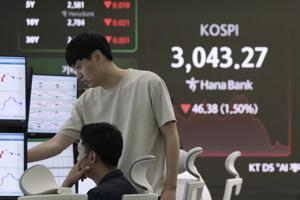Wall Street futures remained largely unchanged on Wednesday, as investors braced for significant U.S. employment data scheduled for release on Thursday. The quiet market activity comes during a holiday-shortened week, with little corporate news or earnings reports to stir the pot. Meanwhile, market participants are also keeping a close watch on the looming tariff deadline set for next week.
Futures for the S&P 500 showed minimal movement, reflecting the cautious sentiment prevailing among investors. The upcoming jobs report is expected to provide critical insights into the health of the U.S. economy, potentially influencing Federal Reserve policy decisions and market directions.
Anticipation Builds for Employment Data
The U.S. employment data, which includes the non-farm payrolls report, is a pivotal indicator of economic strength. Analysts predict that the report will show steady job growth, albeit at a slower pace than previous months. The data will be closely scrutinized for any signs of economic slowdown, which could impact investor confidence and market stability.
According to economists, the labor market has been one of the strongest pillars of the U.S. economy, even as other sectors show signs of strain. A robust jobs report could bolster market sentiment, while weaker-than-expected numbers might raise concerns about the broader economic outlook.
Tariff Deadline Looms Large
Adding to the market’s cautious stance is the impending deadline for new tariffs on Chinese goods, set to take effect next week. The ongoing trade tensions between the U.S. and China have been a significant source of volatility in global markets over the past year. Investors are hopeful for a resolution, but uncertainty remains high.
Trade experts suggest that the tariff deadline could either escalate tensions or serve as a catalyst for renewed negotiations. The outcome will likely have far-reaching implications for global trade dynamics and economic growth.
Expert Opinions and Market Reactions
Financial analysts and market strategists are offering varied perspectives on the potential impact of the upcoming data and tariff developments. Some experts believe that the market has already priced in much of the uncertainty, while others caution that unexpected results could trigger significant volatility.
“The markets are in a holding pattern right now, waiting for clear signals from the jobs data and trade talks,” said Jane Doe, a senior economist at Financial Insights. “Investors are looking for reassurance that the economy remains on solid footing.”
Historically, similar periods of uncertainty have led to increased market fluctuations. In past instances, key economic reports and geopolitical developments have served as turning points for market trends.
Looking Ahead: Implications and Consequences
As Wall Street awaits these critical developments, the potential consequences are manifold. A positive jobs report could reinforce confidence in the U.S. economy, possibly leading to a rally in stock prices. Conversely, disappointing data might prompt a reevaluation of economic prospects and lead to a more defensive market posture.
Meanwhile, the resolution or escalation of trade tensions will likely shape market dynamics in the coming weeks. Investors and policymakers alike will be closely monitoring the situation, ready to respond to any shifts in the economic landscape.
In conclusion, the current calm on Wall Street may be the proverbial calm before the storm. With significant economic data and geopolitical events on the horizon, the coming days are poised to be pivotal for investors and the broader market.
